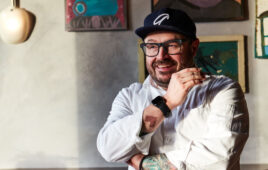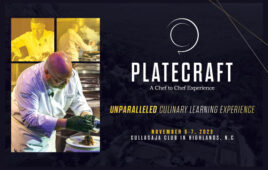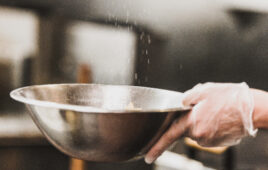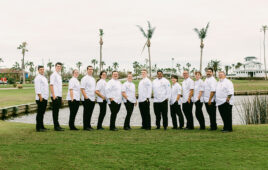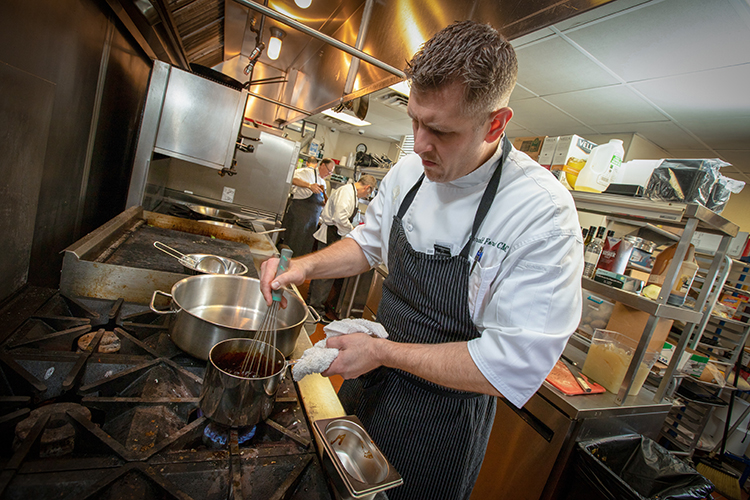
Gerald Ford, CMC, Founder and Culinary Director of Legit Concepts and contributing editor to Club + Resort Chef, says one key to culinary craftsmanship is the ability to bridge artistry and science and maintain a balance between the two.
“The chefs who excel most in our industry are the ones who embrace those characteristics and can play between,” he says. “It becomes easier to be a great artist when you have a scientific understanding of great fundamentals, predictable outcomes.”
Ford says every chef needs to know a set of fundamentals to cook at a baseline level.
“Sauté, braise, grill, steam, fry,” he says. “Basic stuff—but not everyone does fundamentals well.”
Club + Resort Chef (C+RC): Why do you believe some chefs struggle with this?
Gerald Ford (GF): If it’s easy to do, it’s easy not to do.
We’re at a point now, as an industry, where everyone’s experiencing staff shortages. And the first things that start to suffer are those fundamentals.
The world we operate in runs on systems. Those systems are built around science. They’re built around data. They’re built around logic. Beyond that comes this ability to exercise art.
I think people love the idea of the artist—the passion, the emotion—but it’s really hard to work for someone who doesn’t have some predictability. Someone with a more scientific mindset leads to some consistency or predictability. That applies to recipes, but it applies to management and leadership as well.
For me, the most important transition is understanding where those two things overlap. If, as a chef, you’re leaning too far on the side of the artist, embrace some of the science and see if that allows you to be more of an artist. If you’re on the other side, and you are too scientific, or you’re too rigid or framed in, then start exploring the creative side.
The more we can cross over to the opposite side, the better we can be.
C+RC: Can you talk a bit more about artistic versus scientific tendencies in chefs? Why do some chefs lean more toward one or the other?
GF: Savory chefs tend to lean more toward art, and pastry chefs fundamentally lean more toward science.
When making a sauce, a chef will put some ingredients together, taste, adjust, taste, adjust, taste, adjust. When putting a cake together, the pastry chef goes to a tried-and-true formula, replicates it, and executes it.
Now, they do become an artist later on in the process. But when it comes down to that fundamental piece, chefs tend to lean toward art, and pastry chefs fundamentally lean toward science.
One of the things we’re running into now is that many of us were taught artistically. But I think the way that schools train people now is with a more scientific approach.
Now, not only is there the snake pit of the emotional outburst—which the newer generation of cooks won’t deal with—beyond that, many of them are very linear in their thought process. They want to hear about X input plus Y input yields Z output.
I think we greatly harm our relationships in how we’re perceived and received by that generation when we’re not trying to figure out how best to communicate with them.
Part of my success in communicating with newer-generation cooks is helping to translate what I feel are the critical fundamentals into logical, why-based arguments to help them understand why something is necessary and how you can measure it.
C+RC: Why do schools today lean toward scientific teachings?
GF: I think that having that methodical approach allows for a consistent learning method regardless of who’s teaching the material.
The material that they’re teaching has to have a process. It has to yield a result. But, unfortunately, there’s not a lot of the ‘why’ that goes along with it.
There are positives and negatives: No matter who’s teaching you, you learn the basic fundamental criteria. But you’re getting the baseline of everything, and you’re not getting anything beyond that.
C+RC: It seems chefs now must learn more artistry on the job versus in school…
GF: Which is where there’s a lot of falloff, and there’s a ton of attrition in the industry.
That’s something that I’d like to start doing some research and studying. I want to do a big test sample and get to know the newer generation of cooks. I have some theories, but I want to know what drives that attrition.
Anybody who’s thinking about going to college should question the value of what they’re going to spend on their degree.
My dad came from a generation where you had to go to college if you wanted a future. So he made sure I went to college. And I’m glad I did; I met a great group of people. But I didn’t need to spend four years learning what I learned. I know that. When something becomes text in a textbook, it’s already outdated.
The degree I have cost about $145,000—and I question why. Few chef jobs pay over $100,000 a year; it’s less than 10% of the industry. Why are schools charging that much?
Craft is learned by working with someone who has previously excelled in the trade. You learn the best of what they’ve learned. And if craftsmen pass along great fundamentals, it becomes the baseline for the next generation of cooks.
If you go and you get a good, valuable apprenticeship with practical, hands-on learning, does that allow you to have a better skillset and already have three or four years working in the industry? It’s a conversation that we need to have.

